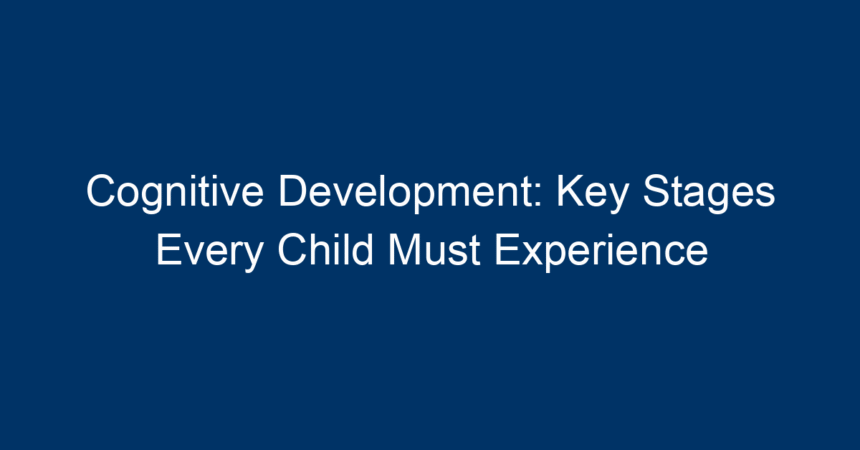Cognitive development is a critical aspect of a child’s growth that shapes how they understand the world. From the moment they are born, children are like sponges, soaking up information and experiences that contribute to their intellectual capacity. Understanding the key stages of cognitive development can help parents, educators, and caregivers provide the necessary support to enhance a child’s growth. This article delves into the essential stages of cognitive development every child must experience, offering insights and actionable tips to nurture this vital process.
What is Cognitive Development?
Cognitive development refers to the progression of a child’s ability to think, learn, reason, and understand. It encompasses various skills, including problem-solving, memory, language acquisition, and critical thinking. This development typically follows a series of stages, as proposed by developmental psychologists like Jean Piaget and Lev Vygotsky, each building on the previous one.
The Importance of Cognitive Development
Understanding cognitive development is vital for several reasons:
- Holistic Growth: It is not merely about academic skills; cognitive development influences emotional and social skills as well.
- School Preparedness: Children with a strong foundation in cognitive skills are often more prepared for school and lifelong learning.
- Early Intervention: Recognizing delays in cognitive development can lead to early intervention, which is crucial for optimal growth.
Key Stages of Cognitive Development
1. Sensorimotor Stage (0-2 Years)
The first stage of cognitive development, as defined by Piaget, is the Sensorimotor stage. During this period, infants explore the world through their senses and motor actions.
Characteristics:
- Object Permanence: Understanding that objects continue to exist even when they cannot be seen.
- Goal-Directed Actions: Babies start to perform acts intentionally, like reaching for a toy.
Tips for Parents:
- Encourage Exploration: Allow infants to explore their environment safely. Provide different textures, sounds, and colors to stimulate their senses.
- Play Peek-a-Boo: This game helps reinforce the concept of object permanence.
2. Preoperational Stage (2-7 Years)
From ages two to seven, children enter the Preoperational stage. Here, language development takes off, and imaginative play becomes dominant.
Characteristics:
- Egocentrism: Children view the world primarily from their own perspectives.
- Symbolic Thought: They start using symbols (like words and images) to represent objects and ideas.
Tips for Parents:
- Encourage Imaginative Play: Provide dress-up clothes and props to stimulate creative thinking.
- Story Time: Read books together, encouraging children to express their thoughts about the story.
3. Concrete Operational Stage (7-11 Years)
The Concrete Operational stage involves more logical reasoning but is still tied to concrete objects and experiences.
Characteristics:
- Logical Thinking: Children begin to understand cause and effect, classify objects, and perform mental operations.
- Conservation: They grasp that quantity doesn’t change even when its shape does (e.g., different shapes of the same amount of liquid).
Tips for Parents:
- Hands-On Learning: Engage in activities that require logical reasoning, like puzzles or board games.
- Encourage Group Work: Allow children to work together on tasks to enhance their social and cognitive skills.
4. Formal Operational Stage (11+ Years)
The final stage, according to Piaget, is the Formal Operational stage. Here, adolescents develop the ability to think abstractly and reason systematically.
Characteristics:
- Abstract Thinking: They can handle hypothetical situations and consider multiple perspectives.
- Problem-Solving: Adolescents become adept at strategizing and planning ahead, using logic to solve complex problems.
Tips for Parents:
- Encourage Debate: Foster discussions about abstract concepts and different viewpoints.
- Promote Independent Projects: Allow older children to choose topics and explore them in-depth, enhancing critical thinking skills.
The Role of Environment in Cognitive Development
While these stages are universal, the environment plays a crucial role in shaping cognitive development. Parents and caregivers can create rich learning environments that cater to their child’s developmental needs.
1. Interactive Learning
Engagement with adults and peers is fundamental. Activities that involve social interaction—like group games or collaborative projects—can significantly enhance cognitive skills.
2. Nutrition and Sleep
Proper nutrition and sufficient sleep are vital for cognitive development. They affect memory, attention, and learning. Ensure children have a balanced diet and a consistent sleep schedule.
3. Stimulating Activities
Encourage participation in a variety of stimulating activities, including:
- Arts and Crafts: Enhance creativity and fine motor skills.
- Science Experiments: Ignite curiosity and analytical thinking.
- Music and Dance: Foster spatial awareness and enjoyment of rhythms, aiding in brain development.
Challenges and Delays in Cognitive Development
Sometimes, children may face challenges that impede their cognitive development. Early identification and intervention are crucial for addressing these issues.
Signs of Delayed Cognitive Development
- Difficulty following directions
- Limited problem-solving skills
- Trouble with language or memory
- Challenges in social interactions
Seeking Help
If you notice signs of delay, consider consulting with a pediatrician or developmental psychologist. Early intervention programs can provide tailored support to help children catch up.
Conclusion: Nurturing Cognitive Development
Cognitive development is a crucial journey that every child must navigate. By understanding the key stages—from the Sensorimotor through the Formal Operational stages—parents and caregivers can better support children’s growth.
Actionable insights include encouraging exploration, stimulating imaginative play, promoting logical reasoning, and ensuring a supportive learning environment. Additionally, remain vigilant for any signs of delay, as early intervention can significantly affect a child’s future.
Investing time and resources in cognitive development not only enhances a child’s academic capabilities but also lays the foundation for emotional and social intelligence. Embrace this journey with your child, and watch them flourish as they discover the world around them.




